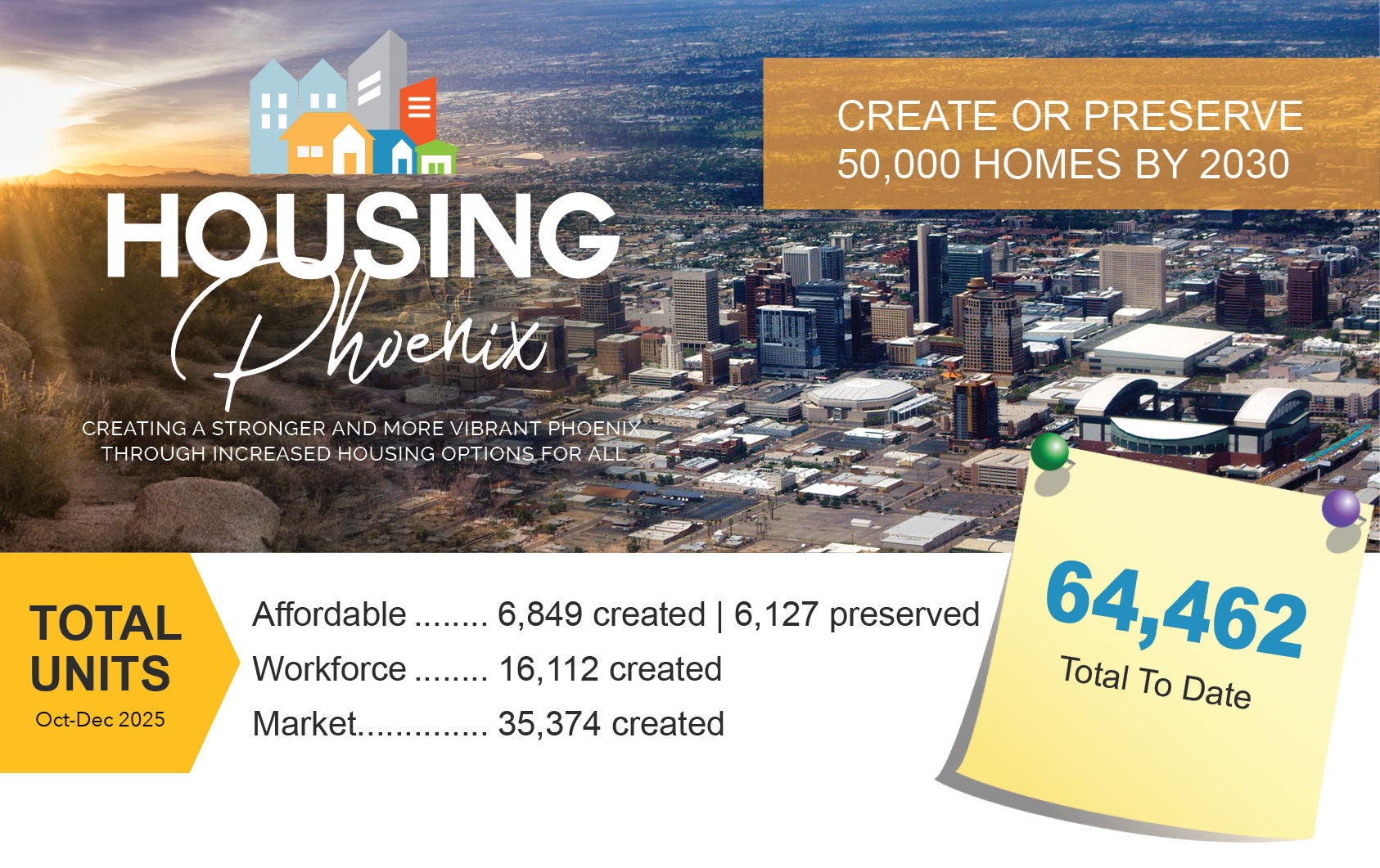The City of Phoenix website will undergo routine system maintenance on Saturday, January 31, 2026. While no major disruptions are expected, some services may be temporarily unavailable between 7:00 AM and 7:00 PM. If you experience any issues, please check back shortly. Thank you for your patience.
Housing Phoenix Plan

Housing Phoenix Plan Quarterly Report
The latest Housing Phoenix Plan quarterly report shows the progress achieved during the period October 2025 - December 2025. The report provides a dashboard of completion, target dates and status comments for each initiative. Additionally, this report includes our ongoing housing unit count documenting the number of units created or preserved to date.

Housing Need and Affordability
Across the nation housing affordability is among the most difficult challenges facing cities. According to the United States Department of Housing and Urban Development’s 2025 Fair Market Rents for Maricopa County, the cost of a two-bedroom apartment is $1,950. To afford this level of rent, a household would need to earn $78,000 annually, or an hourly wage of $37.49 – more than almost $23 above Arizona’s minimum wage.
To assist residents with this challenge, Phoenix Mayor Kate Gallego and City Council approved the city’s first-ever Housing Phoenix Plan, which establishes a goal of creating or preserving 50,000 homes by 2030 to address the housing shortage in Phoenix.
Our vision is to create a stronger and more vibrant Phoenix through increased housing options for residents at all income levels and family sizes. This vision will be achieved through one goal that has nine policy initiatives:
The city will develop an objective place-based scoring matrix for multifamily housing projects to allow City Council and decision makers to analyze the value of new multifamily housing projects throughout the city. The matrix will provide clear goals, through a defined scoring criteria, and give priority to projects that align with the city’s objectives. Scoring criteria will be established to ensure that housing is placed near vital community amenities and resources. This scoring matrix will help communicate to decision makers the importance of the proposed project and help developers reduce the cost of zoning through a more streamlined process.
Development in Phoenix is shaped by our zoning ordinance, which governs land use, building sizes and forms, parking, and more. To ensure that our city can continue to house a diverse population at every income level we need to update our zoning regulations. Updating zoning regulations will make it easier and cheaper to build or preserve different types of housing – such as single-family, multifamily, single room occupancy, accessory dwelling units, senior, and assisted living. This will help meet the needs of our existing and growing population while preserving the character of our neighborhoods.
In response to the severe shortage of affordable housing in our community, the city of Phoenix Housing Department has increased housing efforts through new funding sources, acquiring land, and redeveloping existing city-owned land. These efforts have resulted in the City of Phoenix Housing Department having more affordable housing units underway than ever before.
Now more than ever, our community is aware of the effects an affordable housing deficit can have on our community. There is a growing interest among private and public partners to assist and help solve this affordable housing crisis. Through the creation of a taskforce, this interest can be harnessed to develop new funding and low-interest financing mechanisms for our community. The taskforce would include experienced developers, lenders, community leaders, architects and other community stakeholders.
Several efforts in recent years have blossomed from public-private partnerships. For example, the Arizona Housing Fund was established by nonprofit housing developers, the Home Builders Association of Central Arizona, financial institutions, the Arizona Association of Realtors, the Arizona Community Foundation, and many more. These organizations are coming together to create nonprofit grant opportunities to support and expand affordable housing and reduce homelessness. The Arizona Housing Fund is financed through voluntary donations and a voluntary $25 real estate transaction fee. Since its inception, the Arizona Housing Fund has raised $270,000. Another public-private partnership includes the Home Matters Arizona Fund. This fund was spearheaded by United Healthcare and provides an opportunity to combine community funds from six AHCCCS contracted managed care organizations (including Mercy Care). The fund has an anticipated value of approximately $6,000,000.
Affordable housing development requires a significant amount of subsidy to ensure long term affordability and sustainability. This subsidy can be provided through direct subsidies such as grants, loans, and tax credit programs. Another way to reduce the amount of subsidy needed is through reduction of other costs associated with development or operating affordable housing.
The city will continue to increase affordable housing developer representation on Boards, Commissions and Committees. Affordable housing development has unique barriers and strict timelines. Through increased representation, the intricacies of affordable housing development can be communicated and contemplated as key development decisions are made. Potential boards, commissions and committees may include: Planning Commission and Village Planning Committee, Development Advisory Board, and Bond Committee.
The city has a variety of programs offered through the Neighborhood Services Department and Housing Department that preserve affordable housing for low-moderate income residents or census tracts. We recommend the continuation and expansion of these vital programs to create more preservation opportunities. The following preservation programs and incentives can be implemented to increase the number of affordable housing units preserved.
- Land banking
- Community Land Trust program
- Landlord incentives and resources
- Expansion of Rental Rehabilitation program
Support federal and state legislation that will increase the amount of funding available for the preservation and construction of affordable housing and result in an increase in the amount of affordable housing units developed on an annual basis. For example, two potential statewide legislative changes the city recently supported are the allocation of funding for the State Housing Trust fund and the creation of a State Low Income Housing Tax Credit Program.
Develop marketing and educational materials that can be shared community-wide to tell our housing story and communicate housing need. These materials can be used to provide annual training and presentations to Committees, Commissions and other community stakeholders that are involved in decisions related to affordable housing development.
